Boiler Installation Buckley
Find the best Boiler Replacement in Buckley
Receive 3 FREE New Boiler quotes for your project today! Compare profiles, reviews, accreditations, portfolio, etc... and choose the best service.

Wall-Lag (Wales) Ltd
4.124 reviewsBromfield Industrial Estate, Mold, CH7 1HA, GBWall-Lag (Wales) Ltd is a family owned business specialising in renewable energies including Solar PV, Air Source Pump Heating as well as Air Conditioning units and Commercial Heating and Plumbing solutions. Our team, based in Mold, are experienced in the installation of small, medium and large-scale projects from design through to installation and maintenance. Working with leading manufacturers, our team can advise on the most eco-efficient boilers, heating and plumbing systems to support you. We are entirely independent which means we are not tied to using specific manufacturers or products, so we can design and source the best possible setup for every individual project's needs and requirements. Our project managers, joiners, electricians and building fabric engineers ensure a professional end-to-end solution at all times. Each project is allocated a dedicated designer, project manager and customer service team member, ensuring you are kept informed along every step of the way. We offer a comprehensive range of residential, commercial and industrial eco-efficient solutions throughout the UK.
- Services
- Why Us?
- Accreditations
- Our Team
- Testimonials
- Gallery
Get Quote
CAFgas CIC (community interest company) non-profit
4.966 reviewsUnit 27 Deeside Enterprise Center, Rowleys Drive, Shotton, Deeside, Flintshire, CH5 1PP, GBAt CAFgas CIC, we are a non-profit, social enterprise that uses our profits to help the local community. We are a community interest company that provides boiler installation, boiler repair, and full boiler servicing. Our team of experienced engineers can install a complete heating system in one day if required. We offer a 10 or 12-year warranty for your peace of mind. We also provide finance options to spread the cost of your new boiler. Our mission is to serve our customers and community all year around, and we believe that a new boiler can help make a difference in people's lives. We are proud to support local charities and initiatives, and we believe that our profits should be used to benefit the community.
- Services
- Why Us?
- Accreditations
- Gallery
Get Quote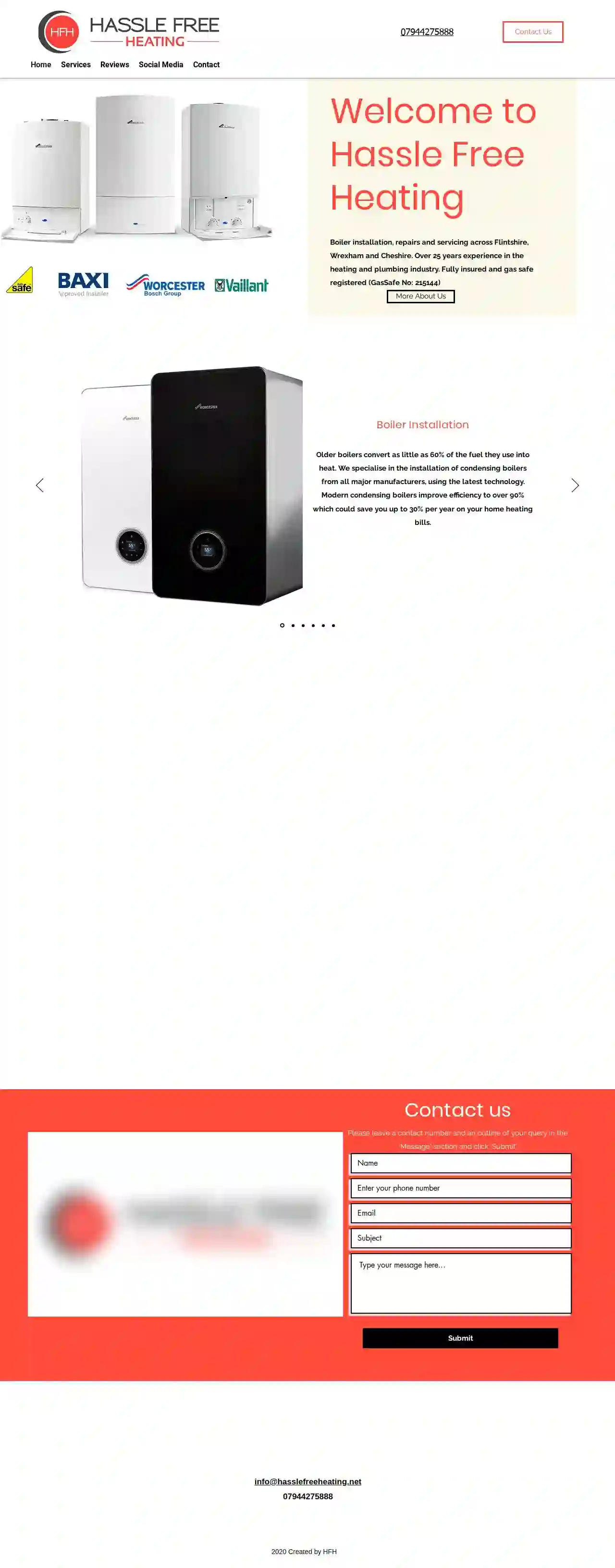
Hassle Free Heating
4.730 reviewsFlint, GBWelcome to Hassle Free Heating. We are a team of experienced heating engineers providing boiler installation, repairs and servicing across Flintshire, Wrexham and Cheshire. With over 25 years in the heating and plumbing industry, we are fully insured and gas safe registered (GasSafe No: 215144). We specialise in the installation of condensing boilers from all major manufacturers, using the latest technology. Modern condensing boilers improve efficiency to over 90% which could save you up to 30% per year on your home heating bills.
- Services
- Why Us?
- Gallery
Get Quote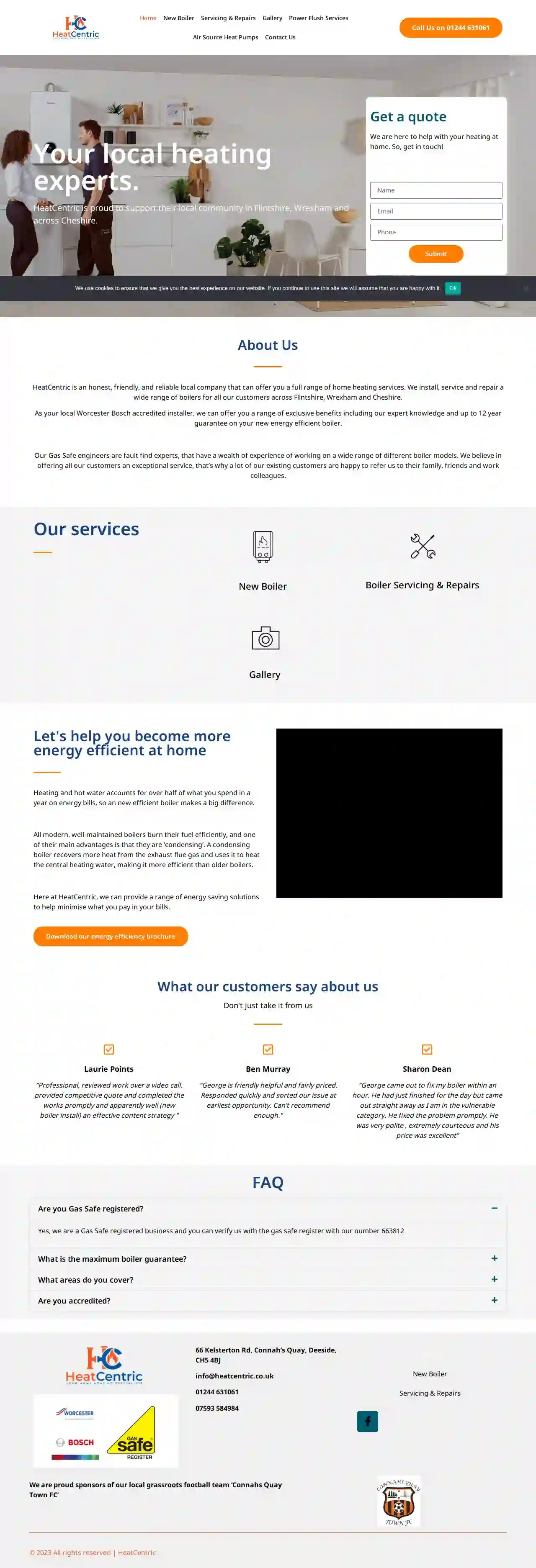
HeatCentric Ltd
519 reviews66 Kelsterton Rd, CH5 4BJ, GBHeatCentric is an honest, friendly, and reliable local company that can offer you a full range of home heating services. We install, service and repair a wide range of boilers for all our customers across Flintshire, Wrexham and Cheshire. As your local Worcester Bosch accredited installer, we can offer you a range of exclusive benefits including our expert knowledge and up to 12 year guarantee on your new energy efficient boiler. Our Gas Safe engineers are fault find experts, that have a wealth of experience of working on a wide range of different boiler models. We believe in offering all our customers an exceptional service, that’s why a lot of our existing customers are happy to refer us to their family, friends and work colleagues.
- Services
- Why Us?
- Accreditations
- Our Team
- Testimonials
- Gallery
Get Quote
SwiftHeat.co.uk
UNIT 23, PEEL INDUSTRIAL ESTATE, BURY, BL9 0LU, GBWelcome to Swiftheat Gas Services Limited. We are a team of gas-safe approved engineers who specialise in warehouse, factory and large-space heating. We supply, install, maintain and service your heating. At Swiftheat, we take pride in our rapid response times and the professionalism and reliability of our service. We prioritise recommending the best course of action for your specific needs, all while ensuring reasonable costs. Our experienced and friendly team of engineers can assist with your commercial or industrial heating project. They will utilise their expertise to maximise the efficiency of your heating system, providing you with optimal performance and savings. Our engineers are fully experienced in Installations, Maintenance, Repairing and servicing all heating appliances from manufacturer products including AmbiRad Heaters, Benson Heaters, Combat Heaters, Reznor Heaters, Powrmatic Heaters, Roberts Gordon Heaters, Space Ray Heaters and Winterwarm Heaters.
- Services
- Why Us?
- Accreditations
- Gallery
Get Quote
GLM Gas & Plumbing
533 reviews8 Conway Avenue, Buckley, CH7 3BS, GBGLM Gas & Plumbing is your local heating specialists with over 20 years of experience. We are a Worcester Accredited Installer, meaning we can offer our customers an extended guarantee of up to 12 years. Finance options are available to our customers to help spread the cost of a new boiler. For full peace of mind, please note that we are Gas Safe registered, fully insured, a Which? Trusted Trader and Verified by Expert Trades. We are proud to offer our services throughout Flintshire and Cheshire. We'd love to hear from you so please get in touch, we'll be able to answer all questions and give you a free, no-obligation quote.
- Services
- Why Us?
- Accreditations
- Our Team
- Testimonials
- Gallery
Get Quote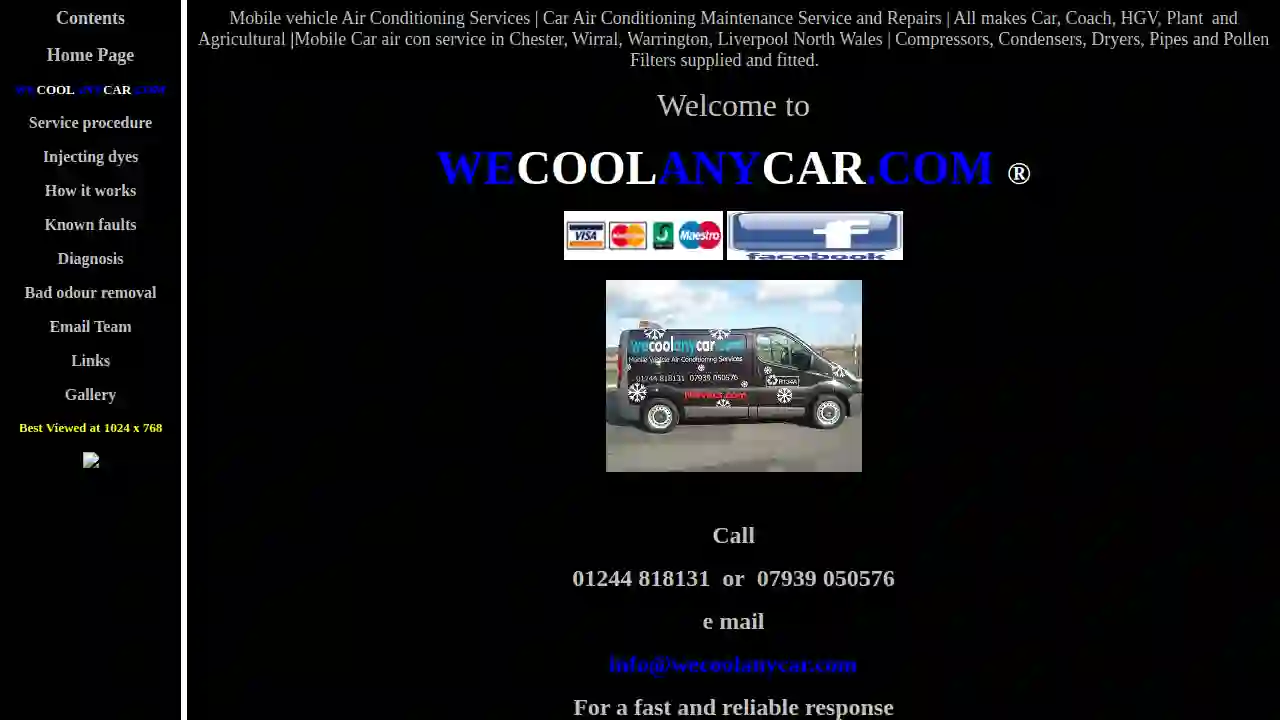
WECOOLANYCAR Mobile vehicle air con sevice, repair and fault finding : CARS, HGV and PLANT
4.7110 reviews123 Main St, Any City, 12345, GBWeCool Any Car is a premier car detailing and repair service provider in [City]. Our team of expert technicians is dedicated to providing top-notch services to ensure your vehicle looks and runs like new. With years of experience and a commitment to excellence, we have built a reputation for delivering exceptional results. Our services include car detailing, paint correction, ceramic coating, and more. We use only the highest-quality products and state-of-the-art equipment to ensure a flawless finish. Whether you're looking for a quick detailing or a comprehensive repair, we've got you covered.
- Services
- Why Us?
- Accreditations
- Our Team
- Testimonials
Get Quote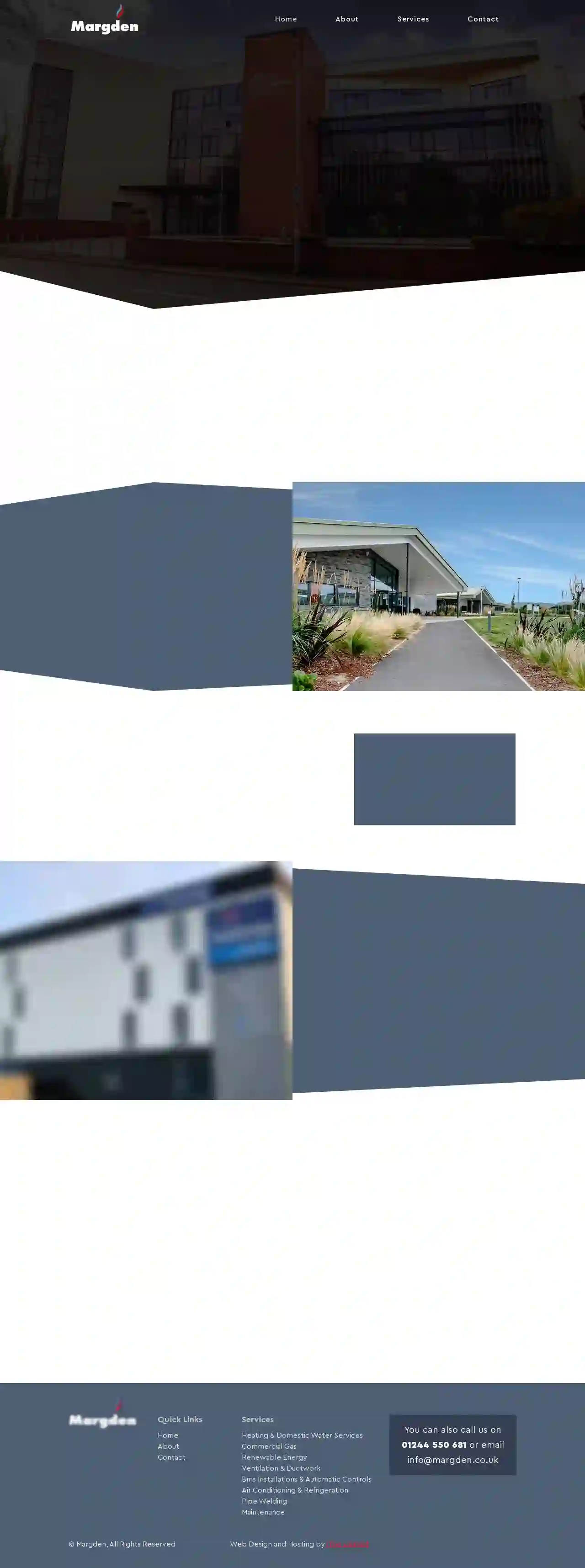
Margden Heating Ltd
54 reviewsFlint, GBMargden Heating Ltd is a leading provider of commercial and industrial mechanical services in Wales and the North West of England. As highly experienced and fully qualified heating and plumbing engineers, we specialise in the installation and maintenance of energy efficient HVAC systems. We enjoy long-standing relationships with our customers, whether we are working direct or via principal contractors and facilities management companies. Maintaining the highest quality and safety standards is a priority here at Margden. We continually invest in our people and plant to ensure we always provide the best possible service. We take the time to understand the exact needs of a project to deliver best practice solutions and long-term value. We install systems of various sizes and complexities at both single and multi-site locations. Due to our extensive experience and unwavering commitment to quality, reliability and care, we consistently meet strict timescales and budget requirements. As a trusted service provider operating within the construction industry, we are committed to achieving the highest standards of quality and care whilst maintaining safe working environments for our engineers and on-site contractors. By following best health and safety practices, we endeavour to minimise the risk of incidents and injuries. We combine these core business values with our considerable industry experience and expertise to add value at all stages of a project. Margden Heating Ltd is a family run, third generation company. We are proud of our long-standing heritage and believe our founding principles of quality, reliability and care are integral to our ongoing success.
- Services
- Why Us?
- Gallery
Get Quote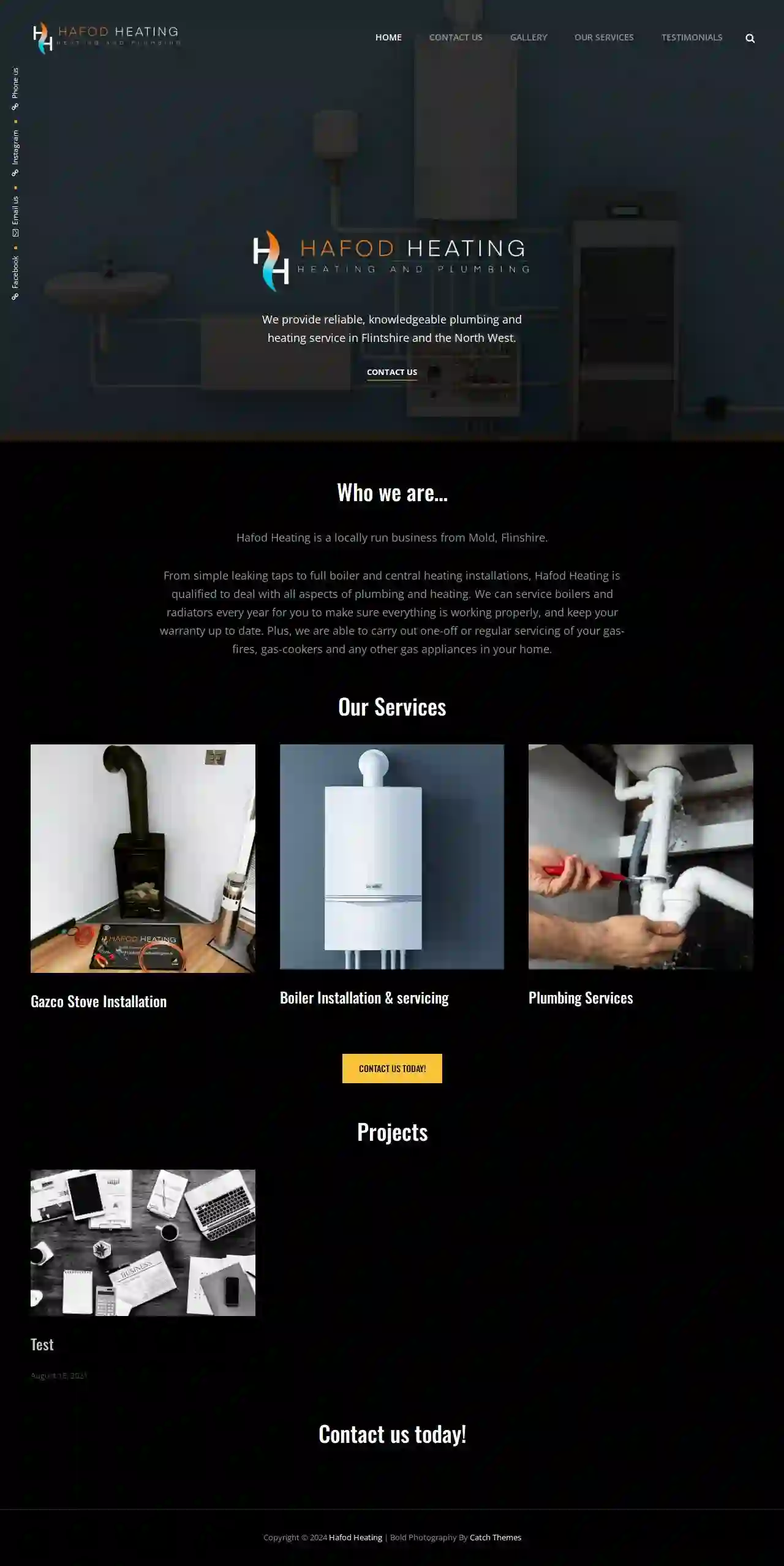
Hafod Heating
56 reviewsMold, GBWe provide reliable, knowledgeable plumbing and heating service in Flintshire and the North West. Hafod Heating is a locally run business from Mold, Flintshire. From simple leaking taps to full boiler and central heating installations, Hafod Heating is qualified to deal with all aspects of plumbing and heating. We can service boilers and radiators every year for you to make sure everything is working properly, and keep your warranty up to date. Plus, we are able to carry out one-off or regular servicing of your gas-fires, gas-cookers and any other gas appliances in your home.
- Services
- Why Us?
- Gallery
Get Quote
Flintshire Appliances
4.930 reviews74 Chester Street, Flint, FLINT CH6 5DH, GBFlintshire Appliances is a proud family owned and operated business, providing top quality appliances and white goods to the people of Flint and surrounding areas. With over 14 years of experience, we have built a reputation for providing excellent customer service, competitive prices, and a wide range of products to choose from. Our showroom in Flint is fully stocked with over 100 appliances on display, and we offer nationwide delivery, free local delivery, and a professional installation service. We are committed to providing the best possible service to our customers, and we are proud to be a local business that is dedicated to supporting the community.
- Services
- Why Us?
- Testimonials
- Gallery
Get Quote
Over 12,692+ HVAC Contractors on our platform
Our HVAC contractors operate in Buckley and surrounding areas!
HVACCompaniesHub has curated and vetted the Best HVAC Companies near Buckley. Find the most reliable business today.
Frequently Asked Questions About Boiler Installation
- Combi Boilers (Combination Boilers): Most common and provide both heating and hot water on demand, saving space by eliminating the need for separate hot water tanks or cylinders. If you use a lot of hot water, consider other options.
- Regular Boilers (Conventional, Heat-Only Boilers): More complex systems that involve both a storage tank and a hot water cylinder. If you have multiple bathrooms or high hot water demand, then this is a good choice.
- System Boilers: They have components built in, reducing installation time and complexity. They are more compact than regular boilers but more expensive than combi boilers. . System boilers are suitable for properties with more than one bathroom or high hot water usage.
- Condensing Boilers: High-efficiency boilers recycle heat from exhaust gases to pre-heat water, minimizing waste. They're better for the environment and can save you money in the long run.
- Your boiler is more than 15 years old: Consider replacing an older unit with a new, high-efficiency boiler.
- Your boiler keeps breaking down: Frequent service calls might mean it's time for a new boiler.
- Your energy bills are increasing: An inefficient boiler uses more energy resulting in costly increases to your heating bills. Consider replacing it with an energy-efficient model.
- Your boiler is making strange noises: Unusual banging, whistling, or gurgling sounds could indicate a problem with your boiler and require professional service.
- Your radiators are not heating up properly: Radiators taking a long time to warm up, or some radiators not heating at all could indicate a boiler malfunction, air in the system, or circulation problems.
- Low water pressure: Low water pressure can be a symptom of issues with the boiler. A qualified technician should investigate the problem. .
- Leaks or drips near your boiler: If you notice leaks or drips around your boiler, turn off your boiler and immediately contact a qualified heating engineer to assess and fix the issue.
- Pilot light goes out frequently: If you have an older boiler and the pilot light goes out frequently, it may need to be repaired or replaced. .
- Yellow flame instead of blue: A yellow flame could indicate the presence of carbon monoxide, which is a dangerous gas. . If you see a yellow flame, turn off the boiler and contact a qualified technician immediately..
- Upgrade to a high-efficiency condensing boiler: Condensing boilers are significantly more efficient than older non-condensing boilers.
- Install a programmable thermostat: A programmable thermostat allows you to set different temperatures for different times of the day , helping you use less energy and save money.
- Insulate your home: Good insulation helps trap heat, keeping your house warm and reducing the amount of work your boiler needs to do. .
- Service your boiler annually: Regular servicing ensures your boiler is operating at optimal efficiency and safety.
- Powerflush your system: Remove buildup that interferes with your system's performance. It also extends the lifespan of your boiler.
What are the different types of boilers?
How do I find a boiler installer near me?
What are the signs that I need a new boiler?
How can I make my boiler more energy-efficient?
What are the different types of boilers?
- Combi Boilers (Combination Boilers): Most common and provide both heating and hot water instantly , saving space by eliminating the need for separate hot water tanks or cylinders. They may struggle to meet high hot water demand for larger households.
- Regular Boilers (Conventional, Heat-Only Boilers): More complex systems that involve both a storage tank and a hot water cylinder. If you have multiple bathrooms or high hot water demand, then this is a good choice.
- System Boilers: These boilers heat your central heating directly and also store hot water in a cylinder. They are generally a good middle ground between other options. Homes with two or more bathrooms benefit from this type of system.
- Condensing Boilers: Highly efficient units that improve energy efficiency by reusing heat from the flue gases. They're better for the environment and can save you money in the long run.
How do I find a boiler installer near me?
What are the signs that I need a new boiler?
- Your boiler is more than 15 years old: Older boilers are much less efficient than modern condensing boilers and are more likely to break down, so upgrading to a new, energy-efficient boiler could save you significant amounts on your energy bills over time.
- Your boiler keeps breaking down: Frequent service calls might mean it's time for a new boiler.
- Your energy bills are increasing: An inefficient boiler uses more energy resulting in costly increases to your heating bills. Consider replacing it with an energy-efficient model.
- Your boiler is making strange noises: Unusual banging, whistling, or gurgling sounds might mean there is a serious issue with your boiler and should be investigated by a qualified heating engineer.
- Your radiators are not heating up properly: Radiators not getting hot evenly or consistently could indicate a boiler malfunction, air in the system, or circulation problems.
- Low water pressure: Low water pressure might mean your boiler is not functioning optimally. A qualified technician should investigate the problem. .
- Leaks or drips near your boiler: If you notice water pooling around your boiler, it's important to get it checked by a professional immediately.
- Pilot light goes out frequently: If you have an older boiler and the pilot light goes out frequently, it may need to be repaired or replaced. .
- Yellow flame instead of blue: A yellow flame on a gas boiler can mean there is incomplete combustion or a dangerous carbon monoxide leak. Seek immediate assistance from a qualified professional.
How can I make my boiler more energy-efficient?
- Upgrade to a high-efficiency condensing boiler: They reduce energy loss and lower your heating bills.
- Install a programmable thermostat: A programmable thermostat allows you to set different temperatures for different times of the day , helping to reduce energy waste and lower heating costs. .
- Insulate your home: Good insulation helps trap heat, keeping your house warm and reducing the amount of work your boiler needs to do. .
- Service your boiler annually: Regular servicing ensures your boiler is operating at optimal efficiency and safety.
- Powerflush your system: Remove buildup that interferes with your system's performance. It also extends the lifespan of your boiler.